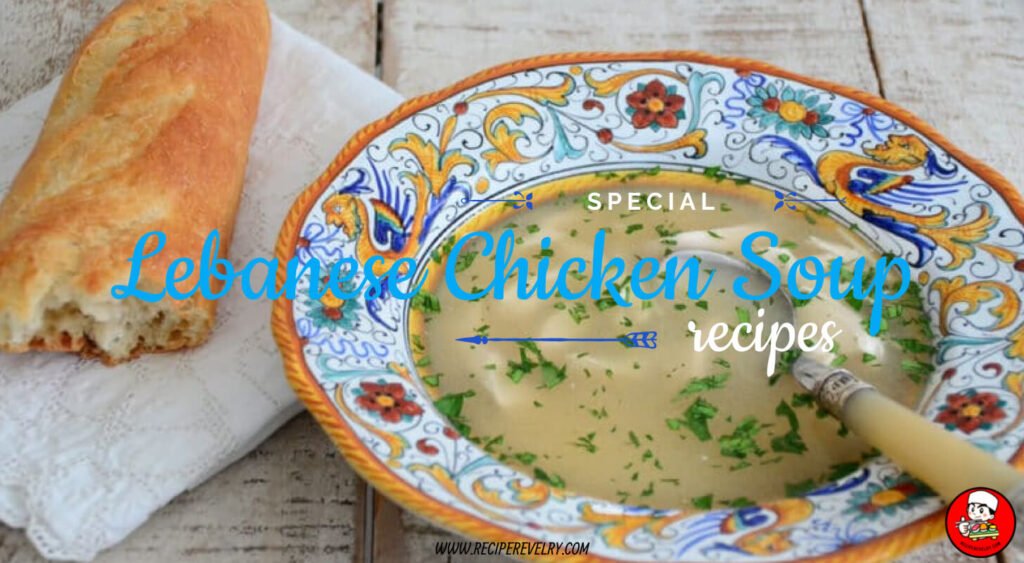If you’re craving a bowl of comfort full of flavour, look no further than the Lebanese Chicken Soup Recipe. This hearty dish has been a staple in Lebanese households for generations, offering a perfect balance of tender chicken, aromatic spices, and a deliciously rich broth. What makes it truly special are the unique spices of Lebanese cuisine—like cinnamon, cumin, and allspice—that infuse the soup with warmth and depth. Whether it’s a chilly day or you need a comforting meal, this soup will quickly become your go-to recipe for ultimate satisfaction.

Essential Ingredients for Lebanese Chicken Soup Recipe
When making a Lebanese Chicken Soup Recipe, the ingredients you choose play a key role in creating authentic flavours and a comforting taste. Each ingredient has its unique purpose, bringing something meaningful to the dish. Here’s a breakdown of the key ingredients and what they contribute to this delicious soup.
Chicken: Chicken is the main ingredient that provides the base flavour. Chicken on the bone, such as thighs or a whole chicken, is preferred because it creates a richer broth. The chicken releases natural juices and flavours as it simmers, making the soup hearty and satisfying.
Garlic: Garlic is essential in Lebanese cooking. It adds depth and a fragrant punch to the broth. When sautéed, it becomes sweet and aromatic, setting the stage for the other ingredients to shine.
Onions: Onions bring sweetness and a savoury base to the soup. They are usually sautéed in olive oil at the start of the recipe to build flavour. The natural sugars in onions balance the spices and enhance the broth.
Lemon: Fresh lemon juice brightens up the soup and adds a zesty tang that balances the richness of the chicken. Lemon is often added at the end of cooking, refreshing the soup.
Spices (Cinnamon, Cumin, Allspice): These spices are the heart of Lebanese chicken soup. Cinnamon adds warmth, cumin gives it an earthy undertone, and allspice adds complexity. Together, they create the signature flavour profile of Lebanese cuisine.
Olive Oil: Olive oil is used in nearly every dish in Lebanese cooking. It adds richness to the soup and helps sauté the garlic and onions, ensuring their flavours blend perfectly.
Salt & Pepper: These basic seasonings help bring out the ingredients’ natural flavours. Salt enhances the taste of the broth, while pepper adds a bit of heat.
Optional ingredient variations can be added based on personal preferences. Some common additions include:
Chickpeas: Adding chickpeas to your Lebanese Chicken Soup Recipe provides extra protein and texture. They blend well with the soup’s flavours and make it heartier.
Rice: Rice is often added to make the soup more filling. It soaks up the delicious broth and gives the soup a creamy consistency.
Vermicelli: Another variation is adding vermicelli noodles. These thin noodles cook quickly, giving the soup a comforting, slightly chewy texture.
Read Also: Chicken and Cream of Mushroom Soup Recipe
Step-by-Step Instructions for Lebanese Chicken Soup Recipe
Follow these simple steps to make a delicious bowl of Lebanese Chicken Soup. The recipe is easy, and each step brings out rich flavours that are sure to impress. Here’s how you can make it:
Step 1: Preparing the chicken (cleaning and seasoning)
Start by washing your chicken thoroughly. You can use chicken breasts, thighs, or a whole chicken, depending on your preference. Once cleaned, cut the chicken into pieces. Then, season it with salt, pepper, and a pinch of cinnamon for that signature Lebanese flavour. Set the chicken aside while you prepare the other ingredients.
Step 2: Cooking the base (onions, garlic, and spices)
In a large pot, heat olive oil over medium heat. Add chopped onions and cook until they’re soft and golden. Then, add minced garlic and cook for another minute, making sure not to burn it. Next, sprinkle in your spices—cumin, cinnamon, and a bit of allspice. These spices are key to giving your soup a distinctive Lebanese taste. Stir everything together until the kitchen fills with a beautiful aroma.
Step 3: Adding the chicken and other ingredients to the pot
Now, add your seasoned chicken to the pot. Stir it with the onions, garlic, and spices to coat the chicken with all those wonderful flavours. Pour enough water to cover the chicken and bring it to a gentle boil. You can add vegetables like carrots or celery at this stage for extra flavour and texture.
Step 4: Simmering the soup to perfection
Once the soup starts boiling, reduce the heat and let it simmer for about 45 minutes. This will allow the chicken to cook through and the flavours to meld together. You’ll notice the broth becoming more prosperous and flavorful during this time. If you’re using a whole chicken, you can remove the bones once fully cooked and shred the meat for a more tender texture in your soup.
Step 5: Finishing touches (seasoning with salt, pepper, and lemon juice)
Once the soup has simmered to perfection, it’s time to taste and adjust the seasoning. Add salt and pepper to your liking. To balance the rich flavours, squeeze in fresh lemon juice. The lemon will give the soup a bright, refreshing kick that complements the spices beautifully. Give it one final stir, and your Lebanese Chicken Soup is ready to serve.
Read Also: Cuban Chicken Soup Recipe
Tips for Making the Best Lebanese Chicken Soup Recipe
When making a Lebanese Chicken Soup Recipe, a few tips can help take your dish to the next level. These simple adjustments can distinguish between a good soup and an unforgettable one. Here’s how you can perfect your recipe:
Adjusting Spice Levels
The spices in this Lebanese Chicken Soup Recipe give it its rich and comforting flavor. You can adjust the spice levels based on your preference. Paprika adds a smoky depth, while cinnamon gives a subtle warmth. Cumin provides an earthy note. If you prefer a milder soup, start with fewer spices and add more as needed. On the other hand, if you like bold flavours, don’t hesitate to use extra spices. Just be sure to taste along the way to find the perfect balance.
Using Fresh vs. Dried Herbs
For that fresh, aromatic flavour, herbs like mint and parsley are essential in Lebanese Chicken Soup Recipes. Fresh herbs have a brighter taste, which enhances the soup. Use fresh mint and parsley for garnishing just before serving if you can. However, dried herbs can still provide great flavour if fresh herbs aren’t available. Remember that dried herbs are more concentrated, so you’ll need less—about one-third of the amount you would use if they were fresh.
Substituting Ingredients Based on Availability
Sometimes, you might not have every ingredient for the Lebanese Chicken Soup Recipe. Don’t worry; there are simple substitutes you can try. For instance, if you can’t find chicken with bones, boneless chicken thighs or breasts work just as well. If you’re missing certain spices, you can experiment with others. For example, turmeric can give the soup a similar warm colour to cinnamon, and dried oregano can replace fresh mint if needed. Just keep experimenting until you find what works best for you!
Achieving the Perfect Broth Consistency
The broth of Lebanese Chicken Soup Recipe is crucial to the overall taste and texture. To get a rich and flavorful broth, simmer the chicken for long enough. The longer you cook it, the more the flavours will develop. If your broth is too thin, you can simmer it uncovered to reduce it and intensify the flavours. On the other hand, if the broth becomes too thick, you can add a little water or chicken stock to reach the desired consistency. The key is maintaining a smooth, rich broth that isn’t too watery or heavy.
Serving Suggestions for Lebanese Chicken Soup Recipe
When serving your Lebanese Chicken Soup Recipe, several ways exist to elevate the meal and make it even more delicious.
Serving with Traditional Lebanese Bread or Pita
One of the best ways to enjoy your Lebanese Chicken Soup Recipe is by pairing it with traditional Lebanese bread or pita. The soft, warm bread is perfect for dipping into the flavorful broth. It soaks up the soup, making every bite even more enjoyable. You can also use the bread to scoop up pieces of chicken and vegetables, making each serving feel extra satisfying.
Pairing with a Side Salad (Tabbouleh, Fattoush)
To complement the rich flavours of the soup, serve it with a side salad like tabbouleh or fattoush. Tabbouleh is a fresh, herby salad made with parsley, mint, tomatoes, and bulgur wheat, offering a refreshing contrast to the warmth of the soup. Fattoush is a crispy, tangy salad with mixed greens and crispy pieces of pita bread, adding crunch and flavour that balances the soup’s texture and spices.
Garnishing with Fresh Herbs and Lemon Wedges
Garnishing your Lebanese Chicken Soup Recipe with fresh herbs like parsley or cilantro and lemon wedges brings extra brightness to the dish. The herbs add a fresh, aromatic flavour that enhances the soup. Squeezing a wedge of lemon into your soup before eating adds a zesty finish, making the broth even more vibrant. These simple touches take your soup from good to great, adding a burst of colour and flavour that everyone will enjoy.
Health Benefits of Lebanese Chicken Soup Recipe
The Lebanese Chicken Soup Recipe is delicious and packed with health benefits. It’s a great way to nourish your body with essential nutrients while enjoying a warm, comforting meal. Let’s break down some of the health benefits of this fantastic soup.
Nutritional Value of Chicken and Vegetables
Chicken is an excellent source of lean protein. It helps build and repair tissues in the body. The protein in chicken also supports muscle growth and helps your body recover from illness. The soup becomes even more nutritious when combined with vegetables like carrots and onions. Carrots are rich in vitamin A, which is excellent for eye health and boosting the immune system. Onions, packed with antioxidants, can help protect your cells from damage. The chicken and vegetables provide a balanced meal with essential vitamins and minerals.
Benefits of Garlic and Lemon for Digestion and Immunity
Garlic is known for its potent health benefits. It contains compounds that help fight infections and boost the immune system. Garlic has been shown to reduce inflammation, making it beneficial for overall health. When added to the Lebanese Chicken Soup Recipe, it provides a savoury flavour while working to improve digestion. Lemon, another key ingredient in this soup, is rich in vitamin C, which helps strengthen the immune system. The acidity of lemon also aids digestion by balancing the body’s pH levels and promoting a healthy gut.
A Warming, Nutrient-Packed Option for Cold Weather or Illness
When you’re under the weather or facing cold temperatures, there’s nothing like a bowl of hot soup to warm you up. The Lebanese Chicken Soup Recipe is perfect for such occasions. Its nourishing ingredients provide hydration, essential nutrients, and a comforting warmth that soothes the body. The combination of protein from chicken, vitamins from vegetables, and the immune-boosting effects of garlic and lemon makes this soup a perfect remedy for colds or flu. It helps you stay healthy and hydrated while giving your body the necessary nutrients to recover.
How to Store and Reheat Lebanese Chicken Soup Recipe
Knowing the proper methods will help keep the flavours fresh and the texture when storing and reheating Lebanese Chicken Soup Recipes. Here’s how you can store and reheat your soup without compromising its quality.
Proper Storage Methods (in the Refrigerator or Freezer)
After preparing your Lebanese Chicken Soup Recipe, allow it to cool down to room temperature before storing it. If you plan to eat the soup within 3–4 days, place it in an airtight container and store it in the refrigerator. For more extended storage, you can freeze the soup. Pour the cooled soup into freezer-safe containers or zip-lock bags, leaving space at the top for expansion. Label the containers with the date to track freshness. The soup can last up to 3 months in the freezer.
Tips on Reheating Without Losing Flavor or Texture
Reheating the Lebanese Chicken Soup Recipe properly is essential to maintaining its flavour and texture. If you are reheating from the refrigerator, place the soup in a pot over low to medium heat. Stir occasionally to ensure the soup warms evenly. If you’re reheating from frozen, it’s best to let the soup thaw overnight in the fridge or use the stovetop to heat it gently. Avoid boiling the soup, as it can cause the chicken to become challenging. Adding a splash of water or broth while reheating can help maintain the consistency of the broth.
How to Freeze Portions for Later Use
Freezing individual portions of Lebanese Chicken Soup Recipe is a great way to save time. After cooling the soup, divide it into smaller portions using freezer-safe containers or bags. Make sure each portion is airtight to prevent freezer burn. For an even more straightforward thawing process, you can freeze the soup in ice cube trays, allowing you to take out small servings as needed. Once frozen, transfer the cubes into a larger storage bag or container. When ready to eat, reheat the desired portion on the stove.
Additional Ideas to Elevate Your Lebanese Chicken Soup Recipe
Here are some additional ideas that can enhance the flavors and texture of your Lebanese chicken soup recipe, making it even more delicious.
Adding Grains Like Rice or Quinoa for a Heartier Soup
Adding grains like rice or quinoa is a great option if you want a more filling version of the Lebanese Chicken Soup Recipe. Rice will absorb the flavours of the broth, making the soup more satisfying. For a delicate touch, you can choose white, brown, or basmati rice. If you prefer quinoa, it’s a healthy, protein-packed option that pairs well with the soup’s spices. Add the grains early in cooking, allowing them to cook in the flavorful broth. This simple step will create a hearty, well-rounded meal.
Experimenting with Different Vegetables (Carrots, Celery, Spinach)
One way to elevate the Lebanese Chicken Soup Recipe is by experimenting with different vegetables. Carrots add a subtle sweetness and a nice colour to the soup. Celery provides a fresh, crisp texture that balances the richness of the chicken. Adding spinach or other leafy greens will boost the soup’s nutritional value while giving it a healthy, vibrant look. These vegetables blend well with the flavours of the soup and can be added at different stages. For softer veggies, add them during the simmering phase. If you prefer a bit of crunch, toss them in towards the end of cooking.
Flavor Variations (Saffron, Turmeric, or Za’atar)
Add spices like saffron, turmeric, or za’atar to your Lebanese Chicken Soup Recipe for those who enjoy experimenting with flavours. Saffron will give the soup a golden hue and a unique floral aroma. Turmeric adds a warm, earthy taste and is known for its health benefits. Za’atar, a Middle Eastern spice blend of thyme, sesame seeds, and sumac, can kick the soup extra. Start with a small amount and adjust to taste. These spices enhance the flavour profile, making your soup stand out with exciting new tastes.
FAQ
What makes the Lebanese chicken soup recipe unique?
The Lebanese chicken soup recipe is unique due to its blend of aromatic spices, such as cinnamon, cumin, and allspice, which create a rich and flavorful broth.
Can I use chicken breast instead of whole chicken for Lebanese chicken soup?
You can use chicken breast for a leaner version, but whole chicken gives a more flavorful broth.
Is it possible to make the Lebanese chicken soup recipe vegetarian?
Yes, you can substitute the chicken with chickpeas or tofu for a vegetarian version of the soup.
Can I add more vegetables to the Lebanese chicken soup recipe?
Add carrots, celery, or spinach to enhance flavour and nutrition.
How do I store leftover Lebanese chicken soup?
Leftover soup can be stored in an airtight container in the refrigerator for up to 3-4 days or frozen for longer storage.
Conclusion
The Lebanese Chicken Soup Recipe is a versatile and comforting dish that can be customized to suit your preferences. Whether you choose to add grains like rice or quinoa for a heartier meal, experiment with different vegetables like carrots, celery, and spinach, or enhance the flavour with spices like saffron, turmeric, or za’atar, this soup offers endless possibilities. It’s perfect for warming up on a chilly day or as a nutritious option. The Lebanese Chicken Soup Recipe will become a favourite in your kitchen with simple ingredients and easy variations.


